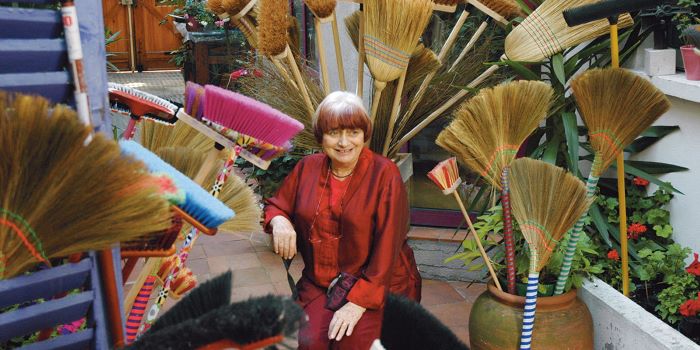Pierre-Henri Gibert is the first director to take on the biography of maverick filmmaker Agnès Varda, apart from Varda herself. Do not expect a tell-all, however. Although there is a trickle of revelations here, this compact, whirlwind overview of her life and varied career serves best as a refresher to her filmography. Gibert recounts some of her greatest hits (Cléo from 5 to 7, Vagabond, and The Gleaners and I) and CliffsNotes of her life story. At 67 minutes, the brevity is palpable.
Yet the new documentary reveals more information about her marriage with her working-class husband, director Jacques Demy (The Umbrellas of Cherbourg), than Varda divulged in her own films that related to her private life (2008’s The Beaches of Agnès; Varda by Agnès, from 2019, the year of her death at 90), but there is a sense that Gibert’s purview has been circumscribed; Gibert doesn’t stay on any topic too long. Varda’s son, Mathieu Demy (who describes his mother as having a “fairly authoritarian temperament”) and daughter Rosalie Varda are producers of this project, made in tandem with the production company their mother founded, Ciné-Tamaris. However, Viva Varda! confirms what many have suspected, that Varda and her husband were polar opposites: She hated The Sound of Music, whereas he loved it.
Talking heads of her collaborators give her image a little tweak. The voices outside of her family provide a chorus of pragmatic views. One assistant admits that she wasn’t “nice,” but adds neither François Truffaut nor Jean-Luc Godard was considered well behaved on a film set. Was she cheap? Well, as her star Sandrine Bonnaire puts it, if Varda could save some money, she would. Filmmaker Patricia Mazuy calls Varda, “a master of promotion,” as she remade herself as a brand in the 21st century: the quirky, wacky, aged inquisitor. This irreverence doesn’t overwhelm or flatten her stature. Her work speaks for itself.
Fans of the peripatetic Varda will nevertheless be impressed by the breadth of her 65-year career as clips speed ahead. It’s as though she had the lives of many artists, first as a photographer, then a filmmaker of narrative films, which range wildly in subject matter and editing style, and documentaries, over many decades. A friend/colleague of Godard, Alain Resnais, and others of the French New Wave (of which she was the self-declared grandmother, and virtually the only female director), Varda was a Zelig with a camera.
Film clips fly by without giving viewers a chance to take them in. Because of this, the documentary will appeal to those already in the know. Yet based on the testimonials and Varda’s fascinating life—the rebellious heir of a wealthy steel factory owner; a single, unwed mother in the 1950s—this will also draw in the unconverted.
Though currently without a U.S. distributor, Viva Varda! would do well to find a home on the Criterion Channel and MUBI streaming services.

















Leave A Comment